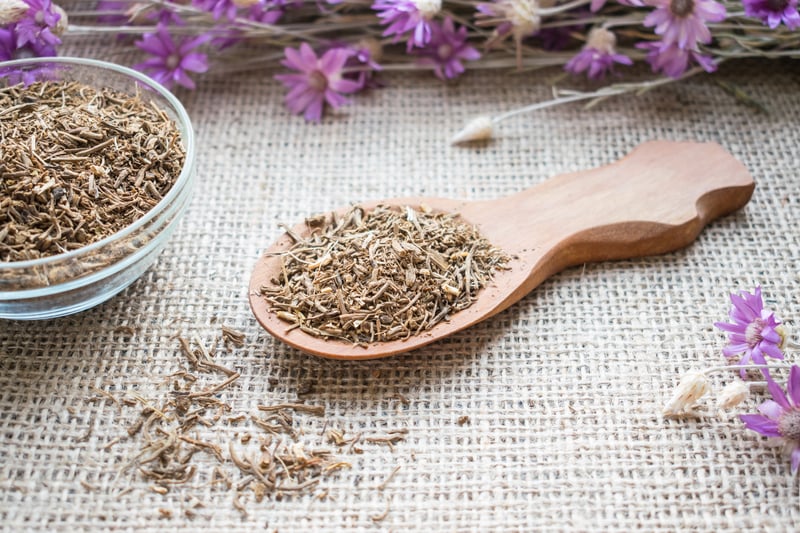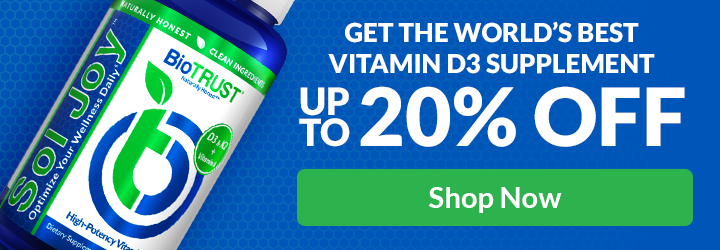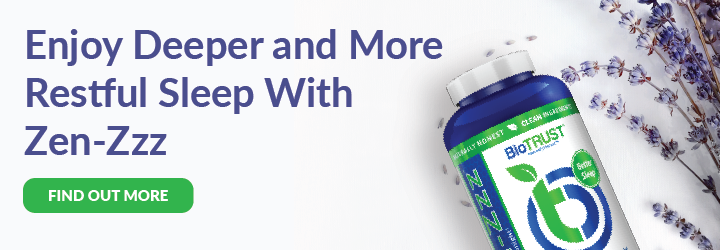6 Best Nutrients and Vitamins for Stress and Anxiety

Life can be stressful. That’s been true for as long as we can remember. But the past year has brought new challenges, and with them, a greater toll on virtually every aspect of life. Many of us have done our best to adapt to virtual work and school (and back), financial difficulties, staying safe and healthy, social distancing, as well as being bombarded with information. On top of that, many of us have been forced to cope with sickness and even the death of loved ones. It’s exhausting and anxiety-provoking. Fortunately, there are key nutrients and vitamins for stress and anxiety that may help.
How we deal with stress is crucial as we navigate through these uncertain times. Basic and highly effective tools include: 1
- Deep breathing and meditation
- Regular exercise
- Spending time outdoors, especially in nature and around trees
- Getting grounded
- Disconnecting from the news (and that includes social media)
- Getting enough sunlight to support circadian rhythm
- Connecting with others—family, friends, neighbors, and pets—and building a strong support network
- Getting enough deep sleep
- Taking time for self-care
- Being kind to others
- And, of course, consuming healthy meals filled with colorful vegetables, fruits, and lean proteins
Again, stress is nothing new. During any given year, we experience stress from jobs, bills, health, family, relationships, and more. For many of us, however, this past year has led to greater pressure than in years past. And that added stress and anxiety can lead to fatigue, headaches, stomach troubles, irritability, anger, nervousness, and more.
Like stress, anxiety is becoming more common. In fact, it’s one of the most common problems in the U.S., and 40 million adults, or 18.1% of the population, are believed to struggle with anxiety from time to time. 2
So, in addition to taking the steps above to help ease stress and anxiety, it’s even more important now to ensure our bodies have the nutritional support they need. Here are the top 6 nutrients and vitamins for stress and anxiety to help battle the negative effects of those seemingly unrelenting pressures we face from time to time.
6 Best Vitamins for Stress and Anxiety
1. B Complex Vitamins
This family of eight vitamins includes B1 (thiamine), B2 (riboflavin), B3 (niacin), B5 (pantothenic acid), B6 (pyridoxine), B7 (biotin), B9 (folate), and B12 (cobalamin). Collectively, these vitamins have important roles in metabolism. For example, they help provide us energy by participating in the enzymatic reactions that help transform the food we eat into the body’s energy currency. They’re also vital for brain and heart health. 3
What’s more, increasing the amount of B vitamins in the diet has been found in research to support healthy levels of neural inflammation and oxidative stress. In turn, this can help provide support for stress symptoms, increase energy levels, and improve mood.4 B complex vitamin supplementation for 90 days has also been found to be an effective and inexpensive strategy to help reduce work-related stress.5,6 Other research has found that supplementing with B vitamins may be an effective way to lift mood and decrease perceived stress. 7
While B vitamins can be found in grains, beans and legumes, meats, eggs and dairy products, as well as leafy greens, research suggestions a large part of the population suffers from insufficiencies or deficiencies of one or more of these vital vitamins. Thus, many recommend supplementing with the entire B complex to support brain health, especially in those who don’t consume a variety of foods containing the vitamins. 3
Supplementation is also more often recommended for those who are over 50 or pregnant, those with chronic health issues, and those who eat a vegetarian or vegan diet as they’re more likely to be deficient.
Because B vitamins are water-soluble, and thus, excess amounts are excreted, B vitamins appear to be both safe and effective. Excessive consumption, though, can cause side effects, including nerve pain. However, you are unlikely to get too much B complex from your diet or with supplements when taken as directed. 8
2. Vitamin D
Vitamin D has so many key roles in the body, is there any wonder it is also involved in mood and brain health? Research has, in fact, found that low vitamin D levels are associated with depression, and what’s more, insufficient levels of vitamin D have been linked to greater perception of stress. In other words, you may be likely to perceive more stress if you don’t have sufficient vitamin D. Ensuring you have optimal levels of vitamin D can help support a healthy mood and healthy stress response, not to mention a properly functioning immune system, which, believe it or not, can be heavily impacted (not necessarily in a good way) by perceived stress. 9, 10
The best way to ensure you have enough vitamin D is to expose your skin to sunlight. Of course, that’s not always possible—especially during the winter (when temps can drop into the teens and lower). In that case, you can eat foods that are rich in vitamin D, such as salmon and mackerel, and/or take a quality vitamin D for stress.
3. Theanine
This amino acid is most commonly found in green tea, but it’s also found (in smaller amounts) in other beverages like coffee, mate, and cola, as well as in some types of mushrooms.
Theanine appears to work in several ways.12 For example, it may promote healthy levels of GABA and serotonin, which are calming neurotransmitters (i.e., brain chemicals). These neurotransmitters also help regulate emotions, improve mood, and enhance alertness and concentration. Yet they also help you sleep.
In addition, theanine may help reduce levels of excitatory brain chemicals that are linked to stress and anxiety. This may explain why theanine may help protect brain cells and fight age-related damage.
Finally, theanine may enhance alpha waves, the brainwaves associated with a feeling of “wakeful relaxation,” which can lead to enhanced feelings of focus and creativity without making you feel sedated. It’s known as an “anxiolytic,” which means it may help reduce feelings of stress and anxiety and foster a state of calm, lowering stress symptoms like elevated heart rate and blood pressure.
Again, the best source of theanine may be green tea. It’s also found in supplements, with 100 to 400 mg being recommended for stress. Start with the smallest amount and work up gradually until you find the effective amount for you.
Theanine is generally well-tolerated, but it isn’t recommended for pregnant or breastfeeding moms, people with low blood pressure, or children. Also, be sure to check with your doctor if you are using other medications.
4. Magnesium
Want a secret weapon to help support exercise performance, healthy blood sugar metabolism, normal blood pressure, migraines, and sleep? Look no further than the mineral magnesium. Magnesium is abundant in the body (the 4th most abundant mineral) and is involved in over 600 reactions that play many key roles in supporting the brain and body. Among its many function, magnesium is an essential player in:
- Converting food into energy
- Forming proteins from amino acids
- Creating and repairing DNA and RNA
- Contracting and relaxing muscles
- Regulating neurotransmitters
And as a natural relaxing mineral, magnesium may help dramatically when it comes to calming the mind and body and easing feelings of stress and anxiety. For example, it allows the body to release tension, fear, irritability, and restlessness. Magnesium has been used to chill out for centuries as it may help stabilize mood and promote a feeling of calmness and well-being, especially in people who are deficient. 11
Fortunately, nature must know how important magnesium is to the diet and included it in a variety of foods, such as avocados, nuts and seeds, dark chocolate, beans and other legumes, whole grains, some fatty fish (like salmon and mackerel), bananas, and leafy greens.
If you’re looking at taking magnesium in a vitamin for stress, the recommended amounts are typically between 75 and 350 mg per day. Be careful going much higher, as getting too much magnesium—particularly in the form of magnesium oxide and magnesium carbonate—can lead to diarrhea, nausea, muscle weakness, low blood pressure, and worse. Choose magnesium glycinate or another chelated form of magnesium, if possible.
5. Passion Flower
Another potential herb to help calm the mind is passion flower, or Passiflora. This herb may increase levels of GABA, which in turn can help the nervous system relax. It may be most effective for those who have seen stress negatively impact their sleep.13 And it’s also recommended to potentially help people who are restless and agitated and may also act as an antioxidant.
Dried passion flower (e.g., Passiflora incarnate) can be boiled in water to make an herbal tea. It’s also available in liquid extracts, capsules, and tablets. Because it can lead to sleepiness, it shouldn’t be taken with sedatives. It also isn’t recommended for pregnant or breastfeeding moms.
6. Valerian Root
Another plant known to help increase levels of GABA and thus help soothe the mind is valerian. It was even used by Greeks and Romans to help ease insomnia, nervousness, and stress. And today it’s best known for its ability to support a good night’s sleep. 14
To improve sleep, valerian can be consumed as a tea by soaking 2 to 3 grams of the root in a cup of water for 10 to 15 minutes. And it’s also found in supplements with 300 to 600 mgs taken 30 minutes to 2 hours before hitting the sack. It can take up to two weeks or more to see positive effects on sleep.
If using it to help calm a busy mind, 120 to 200 mg can be taken 3 times a day, with the last dose taken before bed. However, some folks find valerian root can cause sleepiness during the day.
It’s also not recommended for pregnant and breastfeeding women or children under three. Also, avoid consuming it with sedatives, including alcohol or antidepressants, or drugs, like barbiturates or benzodiazepines.
Rounding Up Vitamins for Stress and Anxiety
Stress is both ubiquitous and inevitable. And it can be even worse during uncertain times. Certain vitamins and herbs appear to be useful tools to add to a variety of coping methods like deep breathing and regular exercise.
Other tools include adaptogenic herbs, ensuring your overall diet is jam-packed with antioxidants from a variety of colorful vegetables and fruits, along with omega-3 fatty acids, as they’re the basic building blocks of a healthy brain and nervous system. Probiotics are also often recommended as they help support gut health and the gut-brain connection. Even regularly consuming a multivitamin supplement that provides B vitamins, vitamin C, calcium, magnesium, and zinc has been shown in research to help support mood and provide helpful support for feelings of anxiety. 15,16
The more stress we’re under, the more tools we may need to incorporate into our lives. No, that doesn’t mean piling up on more and more supplements and pills. Rather, it’s about seeking support and self-care, followed by the right nutrients and vitamins for stress and anxiety for you. If you’re feeling stressed out or anxious, perhaps the best place to start is just by taking a deep breath.





 7 Signs Your Body is Seriously Low on Collagen (not just wrinkles)
7 Signs Your Body is Seriously Low on Collagen (not just wrinkles) Health Expert: "Turmeric Doesn't Work (unless...)"
Health Expert: "Turmeric Doesn't Work (unless...)" 3 Warning Signs Your Probiotic Supplement is a Total Waste
3 Warning Signs Your Probiotic Supplement is a Total Waste

